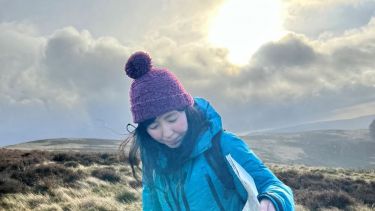The course has been so interesting, inspiring and fulfilling. I am really grateful to be here and to have met so many nice people.

Why are you doing an MA?
Doing an MA in the UK had been one of the biggest dreams after I finished my undergraduate in Japan. I worked for a while in an educational section after graduation from the university to be mentally and financially ready to do MA. Even though it has been challenging to go back to academic life and adjust myself to a different cultural context, it feels like the work experiences I gained in a company in Japan has also helped me a lot for living in the UK. Now I am doing MA Intercultural Communication and International Development. The course has been so interesting, inspiring and fulfilling. I am really grateful to be here and to have met so many nice people.
What’s the topic of your MA dissertation and why is it interesting?
The topic of my MA dissertation is social contact and intercultural sensitivity. I am going to do my dissertation with placement with an NGO in 91̽»¨. The organization has been working on a program which engages with children, not only in 91̽»¨ but also in other cities in England, and encourages them to interact with their pupils from different backgrounds so that they can learn about each other, understand diversity, their own identity, equality, and reduce stereotypes towards their cultural others. I would like to explore how the program has affected students' attitude toward social contact and cultural sensitivity, and how it can improve their intercultural competency.
What’s it like being a postgraduate in the School of Languages & Cultures?
My first impression of the School of Languages and Cultures was very welcoming and friendly, and it has not changed. The lecturers are very kind and always very helpful. The fact that there are many other international students who are doing postgraduate in the same department has been encouraging, and it has been always interesting to talk with other students from many different countries and to exchange ideas in and outside of classes.
How did you find the first few months, in particular?
The first few months were very challenging for me especially because I missed my family and friends in Japan a lot. Also, it took a while to get used to the academic styles in the UK and the speed and different English accents people speak in classes. But gradually, I started to meet new friends and to get used to the academic life here. It was very important for me to not only focus on studies but also to meet new people, socialize, and experience new things. So, even though the first semester was very busy as well as the second semester, I am happy I could visit different places and try many new things so far.
What’s been your highlight of your course?
My highlights of my course have been the ethnography module and the field trip to Peru. In the first semester, I took a module about ethnography. It was a great experience to actually conduct ethnographic research by joining one of the university's societies and learning cultures from people. It was also a good opportunity for me to make new friends and enjoy a hobby as well. In the second semester, I had a chance to visit Peru for one of my core modules, International Development Field Class, and do research with other students from Geography department. Learning about development issues, practicing and building on research skills through the field trip were challenging. But all the experiences I had during the field trip is so precious and I can definitely say it was one of my highlights through my master's degree.
What resources are available to you?
Resources in libraries. Online resources are available through StarPlus. 301 academic services were very helpful to learn about academic skills and to get used to the different academic styles in the UK. English Language Support from English Language Teaching Centre was also helpful. I used the Online Speaking and Language Advisory Service and the Online Writing Advisory Service. Even when I felt too busy to book these services, I have been able to attend Departmental Language Program classes from SLC department or GEO department for international students which have given me chance to gain some ideas for assignments and essays.
What additional opportunities are there in the School?
There are so many different opportunities to join different societies, to meet new people, to visit different cities, to find part-time jobs or volunteer works, to attend various seminars or workshops, and so on.
What are your plans for after your MA?
After my MA, I would like to gain experiences in the international development field. I would also like to be an educator to spread effective intercultural communication skills so that people can feel comfortable living in the diverse society and successfully collaborate in cross-cultural and intercultural environments. Studying on the MA in Intercultural Communication and International Development at 91̽»¨ University has been one of my biggest dreams and it is coming true. I am grateful for this opportunity and for all the people I have met during this course who have inspired me in many different ways. I believe that the intercultural communication skills and knowledge about international development I have been learning through the course will contribute to my goals in the future.
Can you describe the School in 3 words?
Multicultural, Dynamic, Friendly.
For scholarship winners only. Please tell us what winning the scholarship has meant to you and to your future career.
Finance was one of the biggest concerns I had during my preparation to come to the UK and to re-start my academic life. So, I am glad I could reduce my concerns by receiving the scholarship and I really appreciate for this opportunity. I am responsible for studying hard and pushing myself out of my comfort zones. This feeling of responsibility and the great experiences I am having now are encouraging me to keep working on. I would say winning the scholarship is at the start point of my MA, therefore it might not directly affect my future career. However, the confidence I gained through all the experiences during my MA will definitely help me out for the next stages.

International postgraduate taught scholarships
We offer a generous package of financial support for international postgraduate taught students, including scholarships worth £10,000 towards the original tuition fee.
Applications are open for existing offer holders for a postgraduate taught programme starting in September 2025.

